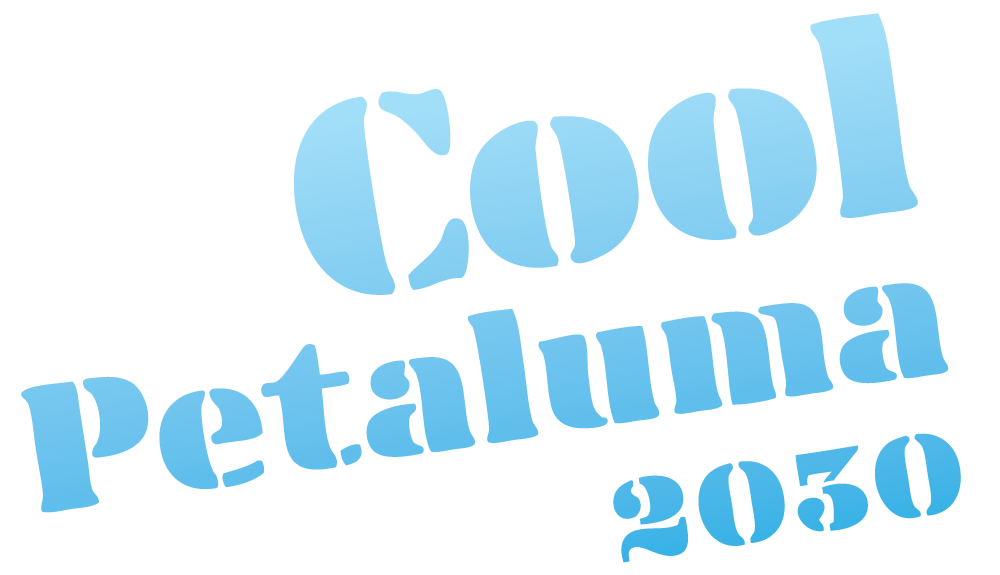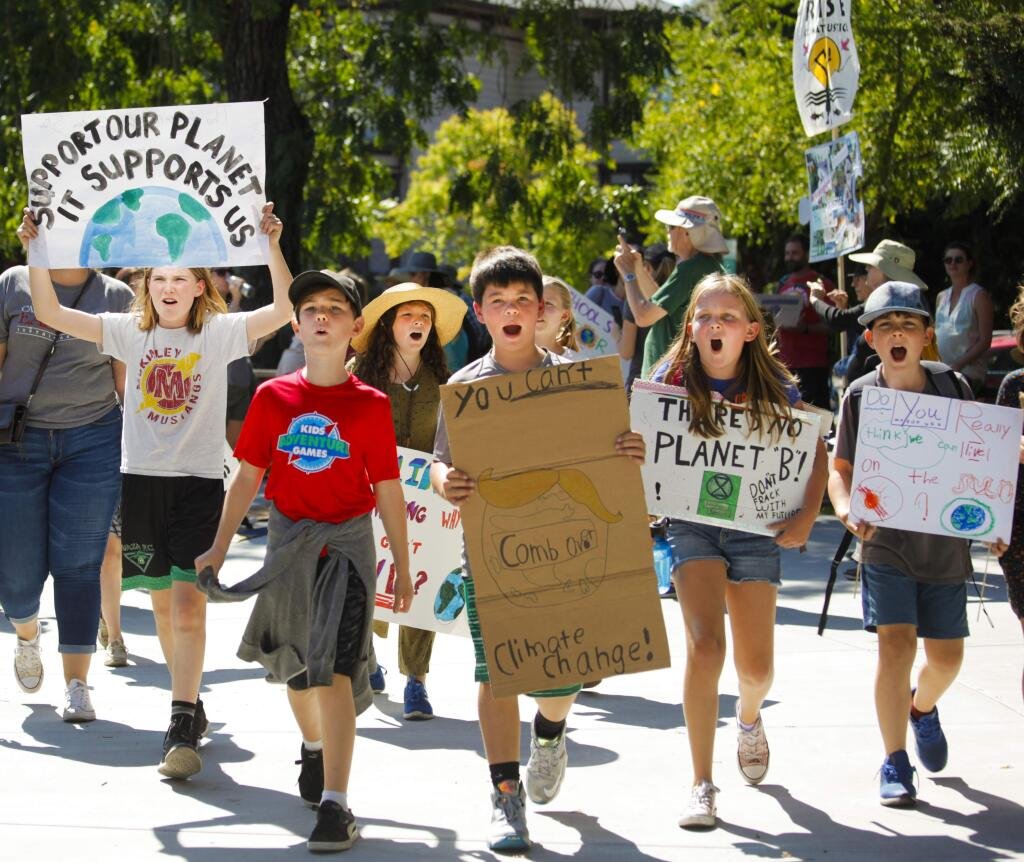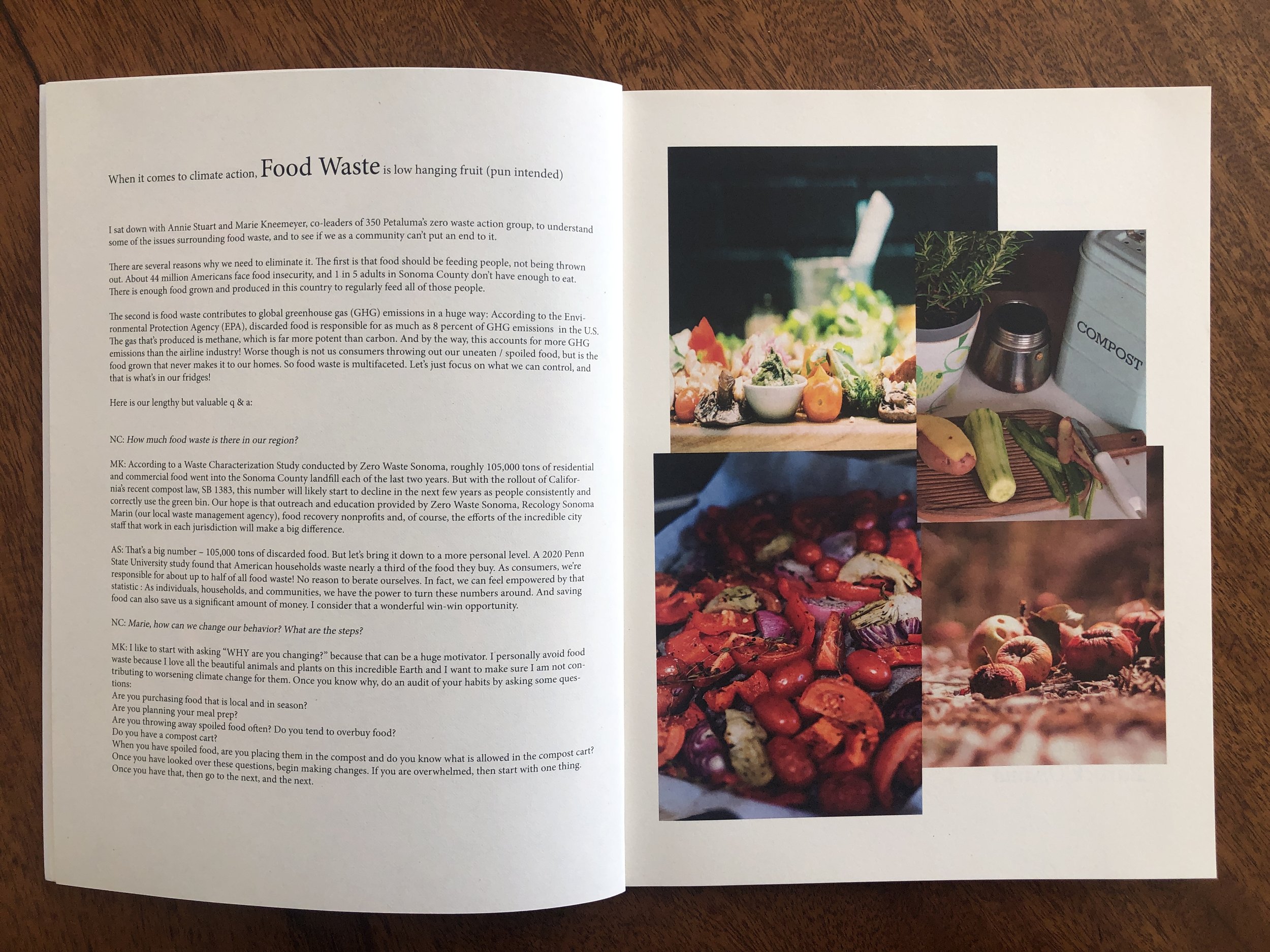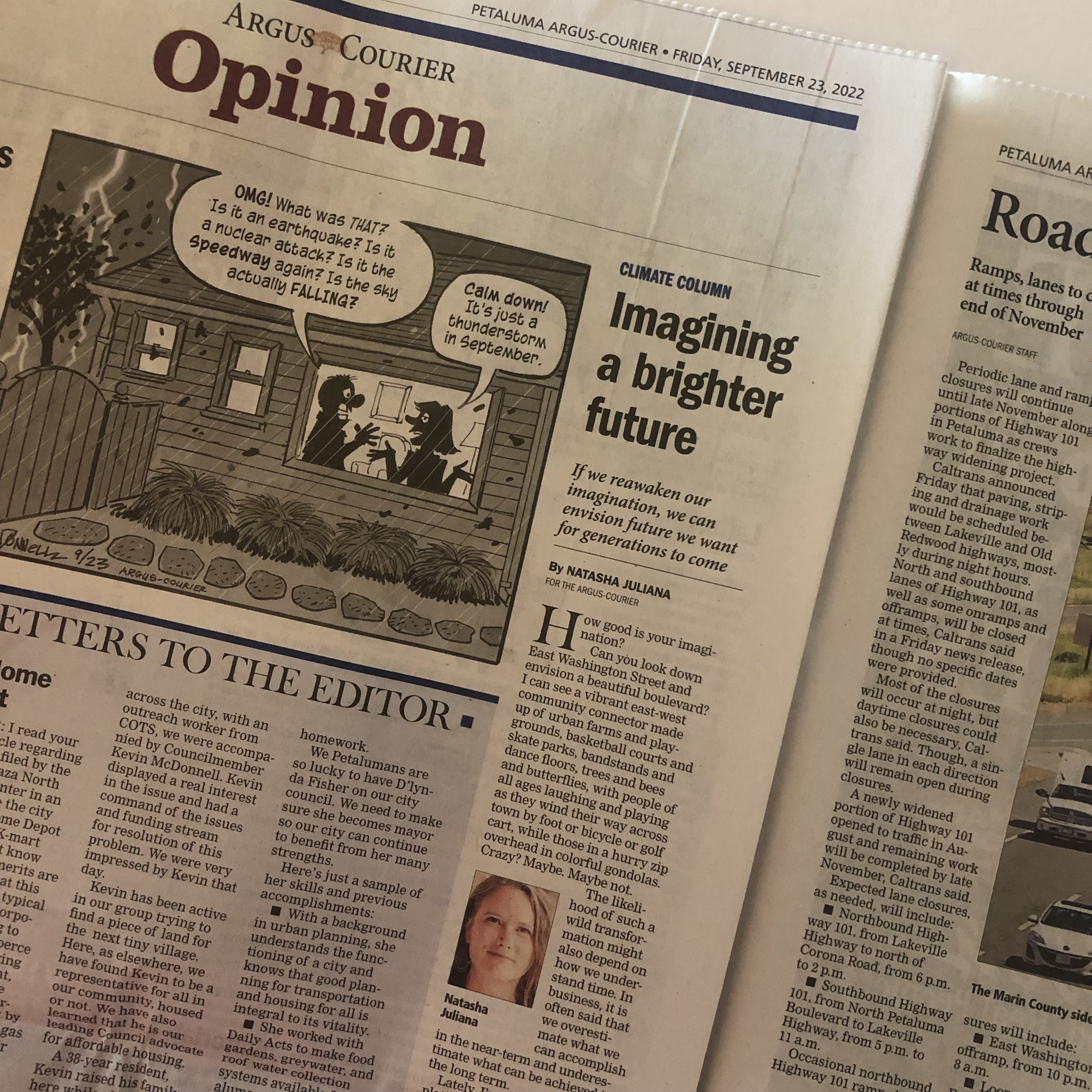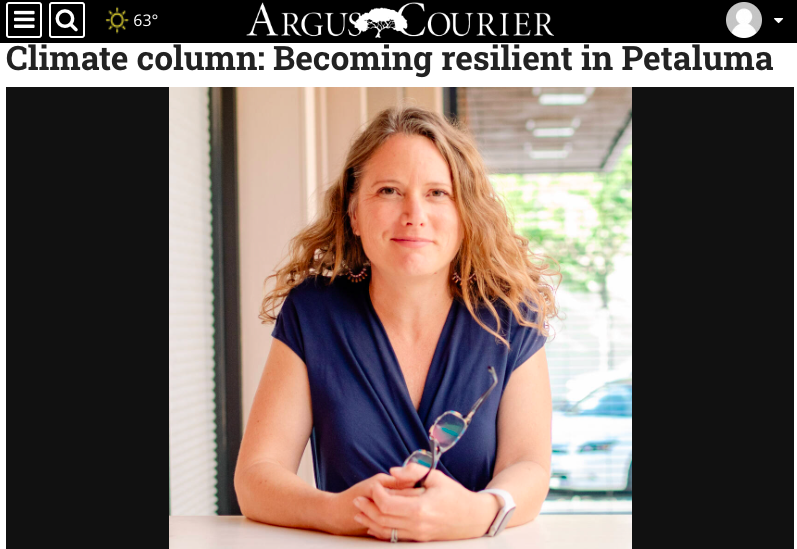Recommended Educational and Inspirational Content:
Interested in learning more about the climate crisis in general? Videos, movie, books, and podcast can be powerful mediums for inspiration and education. Invite friends to join you in engaging with these stories and expand your impact!
Interested in learning more about these Cool Topics: Emergency Prep, Ecology, Building Energy, Transportation, Consumption, and Expanding Impact? Videos, movie, books, and podcast can be powerful mediums for inspiration and education. Invite friends to join you in engaging with these stories and expand your impact!
Monthly Climate Column by Natasha Juliana
It’s easy to get sucked into the vortex of dystopian futures. I often end up doomscrolling crazy unnatural disasters, of which there is an endless supply these days.
In the wake of the Sonoma Complex fires of 2017, I attended former Vice President Al Gore’s Climate Reality Leadership training. Unfortunately, the dire predictions made by his world-class panels of scientists are coming true, and even outpacing many predictions.
’Tis the season for pumpkin spice lattes and holiday parties. As Cool Petaluma celebrated the end of the year with our third annual Stakeholder Shindig on Dec. 5, we announced the launch of our Bring Your Own (BYO) campaign, starting with the ubiquitous coffee cup.
Most people don’t realize that paper cups are lined with plastic and are not recyclable or compostable in our local waste stream. Even paper coffee cups labeled “compostable” go to landfill. If they were truly plain compostable paper, the liquid would go right through them.
Eco-anxiety is defined as “a chronic fear of environmental doom” by the American Psychological Association. In 2021, the Global Study on Youth Mental Health and Climate Change by Lancet Planetary Health surveyed young people aged 16-25 years and found that almost half, 45%, said climate-related stress affected their daily lives.
They also found that 59% are “very or extremely” worried about climate change, that 75% believe “the future is frightening,” and that 83% think “people have failed to take care of the planet.”
Autumn is here. The light is slowly fading, the leaves are just starting to drop, and the 8 a.m. and 3 p.m. traffic has returned to a dull roar.
In the spirit of back-to-school time, let’s take Cool Petaluma’s five-part framework and assign a little bit of homework for all of the adults out there.
My daughter is lucky enough to be the fifth generation to spend time on a small island called Chebeague off the coast of Maine where her great-great-grandmother Janet built a small summer cabin in 1920. Family lore tells us that Janet’s daughter Ann then planted an acorn that became the huge oak that now shades the porch and supports the swing.
As the Greek proverb goes, “A society grows great when old men [or women] plant trees in whose shade they shall never sit.”
I took the Plastic Free July Challenge and it was harder than I thought it would be. This global campaign has collectively prevented more than three billion pounds of plastic waste over the last five years — more than all the world’s biggest cleanup efforts combined. And as they say, an ounce of prevention is worth a pound of cure.
It’s officially summer — the season for taking a break and enjoying the great outdoors. While much of the country has been hit hard recently by unnatural disasters — dangerous heat domes, repeated tornadoes, catastrophic flooding, and golf ball-sized hail — here in Petaluma we have been blessed (knock on wood) with wonderful weather.
Fossil fuels have been instrumental in creating the world we know. So, why must we wean ourselves off them as the basis of our energy? For brevity, we’re going to concentrate on oil and leave gas and coal out of the conversation.
The Butter and Egg Days Parade always falls very close to Earth Day, so it was exciting that this year’s theme was “Greener Pastures - Sustaining Petaluma's Future - Celebrating Petaluma’s march towards a brighter, eco-conscious tomorrow!" In the Argus Courier, Marie McCusker of the Petaluma Downtown Association elaborated, “We believe that the parade's message aligns with the values and interests of Petaluma’s ongoing commitment to climate action.” Yes, please!
After two historically wet winters, memories of past droughts may have dimmed for some. But Mary Lindsay clearly remembers the summer of 2022. “We were in a colossal drought, so the grass in our backyard looked terrible,” she said. “It was common knowledge that grass lawns don’t make a lot of sense in California, but I just didn’t know what to do with our yard.”
By Naomi Crawford, taken from her Launch (ette) Zine, available at her shop Lunchette.
When it comes to climate action, Food Waste is low hanging fruit. (pun intended)
I sat down with Annie Stuart and Marie Kneemeyer, co-leaders of 350 Petaluma’s zero waste action group, to understand some of the issues surrounding food waste, and to see if we as a community can’t put an end to it.
Are you old enough to remember when smoking was normal? Can you imagine a future where pulling up to your friend’s house in a gas car is as unacceptable as walking in the door and lighting up a cigarette?
There are eight billion people on this planet. What is a fair distribution of our finite resources? And what is fair to future generations – our unborn children, grandchildren, great-grandchildren? At the same time, life keeps speeding up.
A baby born today will turn 100 in the year 2123.
Cool Petaluma just marked the end of the year with our second annual Stakeholder Shindig. A compelling combination of fun socializing, inspiring storytelling, and a clear call to action made the night a huge success.
Mayor Kevin McDonnell opened things up with a powerful appeal for civic engagement – most people are concerned about climate change, but what we need is to be fully committed to taking action on this crisis.
Petaluma is creating a “Blueprint for Carbon Neutrality,” and a draft version is now available for review at planpetaluma.org.
This is a big document that outlines what we need to do to live in balance with the natural world and restore ecosystem health for future generations. It means we are taking responsibility for our own role in the current climate crisis and leading the way for other small cities like us across the country.
Flying at 40,000 feet, you can see how thin our atmosphere is. On a school house globe, it would be the thickness of the clear coat. The troposphere – where our weather is – is only about 5-9 miles high, or from Petaluma to Rohnert Park. (It’s thicker at the equator and thinner at the poles.)
When people ask me what I do and I say I work for Cool Petaluma, a community climate action organization, it’s not uncommon for them to then ask, “What’s your real job.” I get it. Maybe I need to come up with a better job description. I’m sure many people who work in the nonprofit sector get this same reaction.
Do you have a SORE? If you don’t, your neighbor probably does. Small off-road engines, appropriately called SOREs, are deeply wounding both people and planet. We’re talking about the ubiquitous use of gas-powered landscape equipment like lawn mowers, string trimmers, and leaf blowers. Ahh, the sweet sounds of Saturday morning!
Taking climate action can be exceedingly complicated and overwhelming. We live on an unusually complex planet with a sophisticated ecosystem that is intricately tied together in ways we are only beginning to understand. The same goes for the global manmade systems we’ve built over the centuries.
Cool Petaluma trained its first cohort of leaders exactly one year ago. They enthusiastically rallied their neighbors and together went on to take actions that reduce their resource consumption while improving their lives.
What does a community-led climate action movement look like? Anyone at last week’s Cool Petaluma Stakeholder Shindig saw firsthand what magic can happen when you combine community building with planetary protection. More than 200 people gathered together with this shared purpose and filled the room with joy, hope, and camaraderie.
For decades, we’ve been told that talking about climate change is divisive and polarizing, a Thanksgiving dinner table taboo that’s better left untouched. What happens if we challenge that assumption and start getting curious?
How good is your imagination?
Can you look down East Washington Street and envision a beautiful boulevard? I can see a vibrant east-west community connector made up of urban farms and playgrounds, basketball courts and skate parks, bandstands and dance floors, trees and bees and butterflies, with people of all ages laughing and playing as they wind their way across town by foot or bicycle or golf cart, while those in a hurry zip overhead in colorful gondolas. Crazy? Maybe. Maybe not.
Look around and you can probably count three or four natural gas appliances that are critical to your home’s performance – water heater, furnace, cooktop, and clothes dryer, perhaps? But “natural” gas is actually about 85% methane - a super-potent greenhouse gas.
When I lived in the Glen Park neighborhood of San Francisco, I could easily walk from my home to a delicious bakery, a cute coffee shop, and a variety of restaurants. There was also a fantastic grocery store, a jamb-packed hardware store, and a mid-century modern furniture store. All of these were locally owned and full of character.
Time, money, and bandwidth seem to be in short supply these days for many of us. The world keeps getting faster, more expensive, and more overwhelming. Given all of the demands on our attention, what are four super simple things we can all do right now to show respect for our beautiful, life-giving, finite planet?
My uncle is a retired FBI agent and he has some stories you wouldn't believe are true. And he also said something a few months ago that really stuck with me. He was giving my 17-year-old daughter some advice about going off to college and being safe in the world…
The Argus Courier has asked our Campaign Director, Natasha Juliana, to write a monthly climate column for the newspaper. Here is the April installment:
When approaching a mammoth-sized challenge, where should we start? How can we identify which lever to pull when there are so many to choose from? It’s easy to be paralyzed into inaction when the issue is as fraught with complexity and controversy as climate change.
